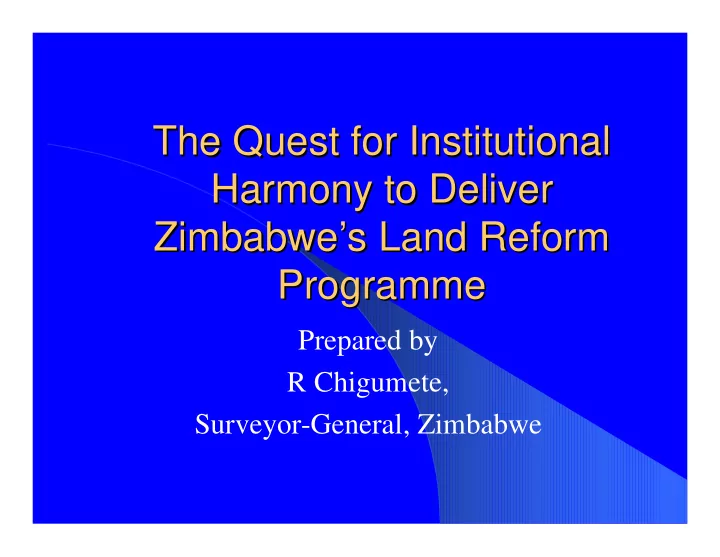

The Quest for Institutional The Quest for Institutional Harmony to Deliver Harmony to Deliver Zimbabwe’s Land Reform Zimbabwe’s Land Reform Programme Programme Prepared by R Chigumete, Surveyor-General, Zimbabwe
Situation Analysis Situation Analysis l Land identification, acquisition, resettlement: LARR, Local Govt l Land information: DSG(LARR), Deeds(Justice) l Land valuation & administration: Local Govt l Agriculture, research, land use planning, extension: LARR l Infrastructure: Transport, Rural Resources and Water Development l Agro-marketing: LARR, private co’s, parastatals l Agricultural financing: Agribank, Agro-financial units in commercial banks, Cottco, Dairibord, GMB, LARR l Farmer training: LARR
Are arrangements effective Are arrangements effective and efficient ? and efficient ? l Institutions have been caught unawares by reforms l Institutions are scattered in various ministries l Land information scattered in different organizations with insufficient integration l Focus and capacity geared towards current tenures on commercial and subsistence agriculture l Legal framework and instruments for land reform unstable l Infrastructure weak, financial resources unavailable
Re- -engineering the Land engineering the Land Re Reform Programme Programme Reform l “The fundamental rethinking and radical redesign of processes to achieve dramatic improvements, such as quality, cost and speed.” M. Hammer, 1993 l “ Every exit is an entry somewhere else” T. Stoppard
The Value Chain The Value Chain Land and Agric. Land Tenure, Policy, Infrastructure, Support Services Markets Land Reform >Agrarian Reform >Food Security >Economic Growth Agro-Marketing Agricultural Financing and Industries
Challenges of LRP Change Challenges of LRP Change Management Management l Growth and survival of agricultural sector based on market development rather than product development l Focus on the future, creativity, knowledge of and decoding the business environment l Establish shared vision by ALL stake holders (goal congruence) l Institutional harmony and integration
Re- -engineering strategies engineering strategies Re
1. Goal Setting 1. Goal Setting l Vision and mission to portray statement of purpose, tangible goal, meaning, direction and image of results l Land resource requirements, ie. target quantum land and population l Stability, viability and sustainability of LRP l Process and timetable l Financial resources and sources l Institutions and role clarity
2. System Architecture 2. System Architecture • Land Survey, Mapping • Land Information Mgt • Land Inspectorate • Registration/Leases • Land Acquisition • Dispute Resolution • Land Allocation • Land Taxation NATIONAL LAND BOARD • Land Use Planning • Monitoring and Evaluation • Regulation • Environment Control
3. Financial re- -engineering engineering 3. Financial re l Turnaround phase: investment in infrastructure (roads, water, schools, clinics), support services (extension, training) l Integration with private sector players l Agricultural finance through partnership with banks, donors l Equity, collateralisation of properties, taxation l Series of institutions to provide inputs and selling outputs l Appropriate/rational economic policies to promote investment.
4. Human Resources and 4. Human Resources and Development Development l Land administration, management, planning and land information sciences
5. Information Systems 5. Information Systems l Land information and land information management systems l Investment in appropriate technology l Integration of information systems for effective decision-making
Change Management Process Change Management Process Original Transitional New State State State Melt Distil Consolidate Heat
Benefits of re- -engineering engineering Benefits of re l Transparent, accountable reform process attracting local and foreign investment; high growth potential l Food import substitution, drought mitigation, l Achieve competitive advantage by revival of agro- processing industries through agro-output l Extensive distribution/marketing network, l Exploitation of regional trade protocols, access to forex, l Economic growth
Constraints Constraints l Current system inertia l Limited expertise, capacity in public sector l Reform affects private sector but is limited to public sector l Limited investment capacity by beneficiaries l Commercial and subsistence tenures l Marketing of idea, too many players
l Thank you
Recommend
More recommend